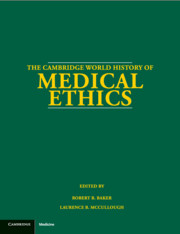Book contents
- Frontmatter
- PART I AN INTRODUCTION TO THE HISTORY OF MEDICAL ETHICS
- PART II A CHRONOLOGY OF MEDICAL ETHICS
- PART III DISCOURSES OF MEDICAL ETHICS THROUGH THE LIFE CYCLE
- PART IV THE DISCOURSES OF RELIGION ON MEDICAL ETHICS
- 9 The Discourses of Hindu Medical Ethics
- 10 The Discourses of Buddhist Medical Ethics
- 11 The Discourses of Confucian Medical Ethics
- 12 The Discourses of Early Christian Medical Ethics
- 13 The Discourses of Orthodox Christian Medical Ethics
- 14 The Discourses of Roman Catholic Medical Ethics
- 15 The Discourses of Protestant Medical Ethics
- 16 The Discourses of Jewish Medical Ethics
- 17 The Discourses of Islamic Medical Ethics
- PART V THE DISCOURSES OF PHILOSOPHY ON MEDICAL ETHICS
- PART VI THE DISCOURSES OF PRACTITIONERS ON MEDICAL ETHICS
- PART VII THE DISCOURSES OF BIOETHICS
- PART VIII DISCOURSES ON MEDICAL ETHICS AND SOCIETY
- Appendix: Biographies: Who Was Who in the History of Medical Ethics
- Bibliography
- Index
13 - The Discourses of Orthodox Christian Medical Ethics
from PART IV - THE DISCOURSES OF RELIGION ON MEDICAL ETHICS
Published online by Cambridge University Press: 28 May 2012
- Frontmatter
- PART I AN INTRODUCTION TO THE HISTORY OF MEDICAL ETHICS
- PART II A CHRONOLOGY OF MEDICAL ETHICS
- PART III DISCOURSES OF MEDICAL ETHICS THROUGH THE LIFE CYCLE
- PART IV THE DISCOURSES OF RELIGION ON MEDICAL ETHICS
- 9 The Discourses of Hindu Medical Ethics
- 10 The Discourses of Buddhist Medical Ethics
- 11 The Discourses of Confucian Medical Ethics
- 12 The Discourses of Early Christian Medical Ethics
- 13 The Discourses of Orthodox Christian Medical Ethics
- 14 The Discourses of Roman Catholic Medical Ethics
- 15 The Discourses of Protestant Medical Ethics
- 16 The Discourses of Jewish Medical Ethics
- 17 The Discourses of Islamic Medical Ethics
- PART V THE DISCOURSES OF PHILOSOPHY ON MEDICAL ETHICS
- PART VI THE DISCOURSES OF PRACTITIONERS ON MEDICAL ETHICS
- PART VII THE DISCOURSES OF BIOETHICS
- PART VIII DISCOURSES ON MEDICAL ETHICS AND SOCIETY
- Appendix: Biographies: Who Was Who in the History of Medical Ethics
- Bibliography
- Index
Summary
INTRODUCTION: BEFORE AND BEYOND THE SCHOLASTIC–ENLIGHTENMENT PROJECT
There is a continuity between the commitments of the Scholasticism that emerged in the thirteenth century and the Enlightenment project of providing a discursive rational account of proper moral probity. Although the Enlightenment attempted to give an account of morality undirected by revelation and ecclesiastical authority, thus involving a substantive break with previous moral and political assumptions, the Enlightenment as well as Scholasticism share a substantive commitment to reason's abilities to provide a universal account of morality. Bioethics as it took shape in the 1970s reflected a late-Enlightenment attempt to provide a secular surrogate for the religious moral authorities that had once guided the West (Engelhardt 2002). Secular and Western Christian bioethics have drawn on philosophical assumptions regarding the capacities of discursive reflection. They both have a penchant for identifying moral truths with the deliverances of systematic moral reflections. In contrast, Orthodox Christianity lives in an understanding of morality unaltered by Scholasticism, the Renaissance, the Protestant Reformation, and the Enlightenment.
Orthodox Christianity understands the moral life to be a whole, a way of life within which one can enter into union with God. Orthodox theology, morality, and bioethics identify this way of curing the soul of self-love such that distinctions among dogmatic theology, moral theology, and liturgical theology threaten to distort and disorient the lived appreciation of theology as a practice transcending the confines of the academy.
- Type
- Chapter
- Information
- The Cambridge World History of Medical Ethics , pp. 211 - 217Publisher: Cambridge University PressPrint publication year: 2008
- 1
- Cited by

